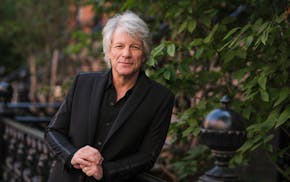The room is nearly full around lunchtime at Bordertown Coffee in Dinkytown. Some tables are taken up by groups of two or three chatting over empty plates and lattes. Many, however, are occupied by a single person, typing on a laptop amid the buzz of clanging dishes, hushed conversations and indie rock music.
Among this crowd is Madeline Friske. The University of Minnesota senior stopped in at 9:45 that morning to chip away at her thesis. The coffee shop is part of Friske's routine, where for about four hours at a time, she settles in and cracks the books.
Friske is among a growing group of laptop workers who spend hours capitalizing on free Wi-Fi, taking up space and nursing single drink orders at neighborhood java joints. These "laptop squatters" are an obstacle for some coffee shop proprietors who want to balance hospitality with profitability.
Others embrace a policy that encourages patrons to stay as long as they want -- within reason. Their approaches include everything from timed password access to limited access during peak hours.
At Coffee Bené near the University of St. Thomas in St. Paul, when customers buy a drink, they get a Wi-Fi password good for two hours, said manager Kellie Langworthy. The password is renewed with each new purchase.
Common Roots Cafe in south Minneapolis turns off Internet access during peak hours, from 6 to 8 p.m. daily plus from 10 a.m. to 1 p.m. on weekends. For owner Danny Schwartzman, it's about balancing the cafe's restaurant and coffee businesses.
"We want to walk a fine line. We never want to scare customers away, but at the same time, people are generally pretty understanding of, well, we do serve coffee and some people treat it like a coffee shop," Schwartzman said. "In the middle of dinner at a restaurant is probably not the best time for them to take over for a couple hours."
Even though the response was not instant, Schwartzman has noticed business flowing more smoothly since the policy was put in place a couple of years ago. And for the most part, the regulars are understanding.
"We have really supportive people who care about the restaurant, and generally speaking, they look around and if they see that there's trouble for people getting a table, they're going to probably pack up a little early," Schwartzman said.
It's not just the students.
A 2010 survey by WorldatWork, a global human resources association, found that 34 percent of U.S. respondents reported working out of a cafe or restaurant in the previous month, compared with 23 percent in 2008.
American companies are trending toward more flexible work practices, according to Lisa Leslie, an assistant professor of work and organizations at the University of Minnesota's Carlson School of Management. "It's good for them [workers] in terms of their attitude toward their job, so they report higher levels of satisfaction ... and there is some evidence to suggest it also helps them be more productive when they are able to have more control of how they structure their workday."
At Coffee News Cafe near Macalester College in St. Paul, customers are welcome to stay as long as they like, unless there's a line of customers waiting for tables. "We ask people, 'Are you close to being finished up? We have people waiting for a table.' We kind of move into that mode, where we are more proactive about finding people to finish up and move on out," said manager Stephen Schweckendieck.
Stephen Miller, Bordertown Coffee's manager, doesn't ask customers to leave.
"It's just not something we're comfortable doing. I could maybe understand why some places might, but we're kind of a second home for students and faculty here, so it's really important that we keep that feeling going," he said. "For us, it's just not the kind of culture we're trying to promote here."
Dunn Bros. considers laptop users when designing new locations, installing dedicated spaces where squatters can work and charge their computers without taking up tables meant for larger groups.
"We try to deal with it more in terms of creating more efficient spaces for people to work and stay for an extended period of time, as opposed to placing hard time limits," said Mark Christenson, the company's vice president of marketing.
For some people, the constant hum of a coffee shop is a welcome reprieve from the silence of offices, homes and libraries.
"I can't study at home, because I get really distracted at home, or I find other things to do," said Friske, the U senior. "But at coffee shops there's enough going on that you're focused on your work, but it's not like a library that it's silent." Friske studies at coffee shops about four times a week, often buying one item and staying for up to four or five hours.
"If it's full, I can understand you should maybe give up your spot, if you're not ordering anything, but I think if you're here for a few hours and you order something, I think you have the right to use the Internet," Friske said.
Katherine Ehrenreich, an anthropology student at Macalaster, studies at Coffee News Cafe once or twice a week and usually stays for two to three hours. Her drink order depends on how long she stays. "Especially if there's a lot of people at the coffee shop and I'm taking up space, I try to get something extra if I'm here for too long," she said.
- Peter Funk is a University of Minnesota journalism student on assignment for the Star Tribune.
Complex stories of migration are among the finalists for the Women's Prize for Fiction
Olympian Kristi Yamaguchi is 'tickled pink' to inspire a Barbie doll

After 4 decades in music and major vocal surgery, Jon Bon Jovi is optimistic and still rocking
Rom-com author Emily Henry knows the secret to having a healthy relationship with love

